(Where's Waldo? Who gives a shit! Where's the bus to Galle?)

Anyway, one afternoon Al Jazeera had a story on drought in America, and the story showed images of dry fields, towns with no fire protection and empty swimming pools. Then there was an interview with a woman standing in front of a very large home in Atlanta, and it was fun to hear a Southern accent after such a long time. Having lived in North Carolina for five years, we are well aware of the problems of the drought. This woman, however, was speaking emotionally about the hardships faced by some Atlantans who, due to the drought, had to live with brown lawns. Some had spent tens of thousands of dollars to drill private wells so watering the lawns and landscaping could continue unabated. Viewing this from Sri Lanka -- even from the comfort of our hotel -- made me wonder if the woman in Atlata had lost her mind.
(Anurahadpura)
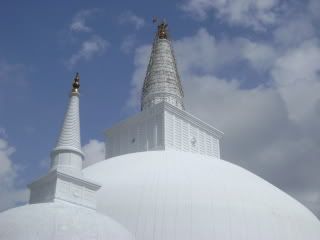
The more I think about it, the more Sri Lanka resembles Ethiopia. Both countries harbor vivid remnants of ancient religions -- in Ethiopia it was the Coptic branch of early Christianity -- and harbor physical relics of that history. In both countries travel is fairly difficult and uncomfortbale. Both countries had the same ability to simultaneously enthrall and repulse. (Street scene in Sri Lanka: belching busses, endless horns, fish smells, sewage, unrelenting heat, people on either side of you trying to sell bottled water and lottery tickets, and a mass of school boys yelling simultaneously, "Hello sir! Hello madam!) Both countries, also, have had civil wars. When I was in Ethiopia, in 1997, the country had just ceded a strip of land that had become Eritrea. Ethiopians were saddened by this. The song you heard at the time in every restaurant and on every bus was this grating pop tune titled "Zero-zero," though it was pronounced "cero-cero." The song said, in essence, that if Ethiopia kept dividing itself to appease every group that came along then "soon we will all be zero-zero."
(Pilgrims in Anurahadpura)
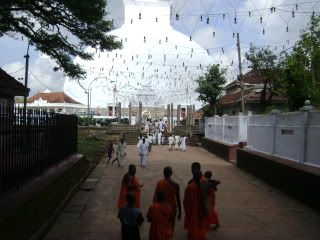
Sri Lanka has had a much longer civil war to deal with -- a war some 30 years long. The central government has been battled a group called the Tamil Tigers, a Muslim group which wants to create an autonomous state in the northern part of the island. Earlier this year the Colombo government announced it was breaking a cease fire in order to achieve peace by either killing all the remaining Tigers or pummeling them until they surrender. So far, the central government is pretty far toward achieving its goal. The Tigers, who just a few years ago controlled the nothern end of the island, have been pushed on to a 10-mile long strip of west coast, where they have surrounded themselves with civilians. It's hard to get a very firm idea of exactly the situation here as the media is rampantly pro-government, but jubilant people on the street predict that within a few weeks the country could be at peace. Unfortunately, news that peace was about to break out have been tempered by the realization that years of war have left the country bankrupt.
(Anurahadpura)
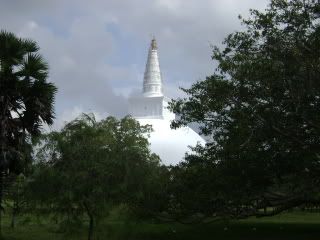
Sri Lanka resembles Ethiopia in another way -- low per capita income. When I visited Ethiopia in 1997, it had the world's second lowest per capita income -- $60 per person per year. The lowest, incidentally, was a country I visited a few months later -- Mocambique, where the annual average was $50. While I'm no economist, I do believe that the math is fairly simple. For every person at the time in Ethiopia who earned $90 a year, there was one earning $30. For everyone earing $120, there was one earning nothing. For everyone earning $240 a year, there were two (or is it four -- OK, now I'm confused) earning nothing.
(Musicians under the bo tree in Anahadpura. This tree grew from a graft of the tree in India under which the Buddha found Enlightenment.)
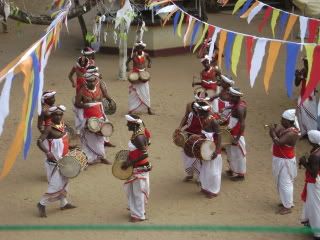
Well, good times have ensued and the per capita income in Ethiopia in 2006 had shot up to $180. (Mocambique, incidentally, had grown to $340 while the world's lowest was Burundi, at $100, followed by Democratic Republic of Congo, Liberia, Malawi, and then Ethiopia.
(Anurahadpura)
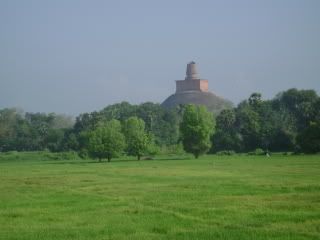
In Sri Lanka, in 2006, the per capita was a respectable yet still lowish $1,300 per person. That figure is low enough to classify the nation as low to middle income and while the figure means many Sri Lankans face grinding povery on a daily basis, recent growth (6 percent is forecast this year) means it is rising at faster than world standards.
(Ruins of the 11th Century mountaintop royal temple in Siguriya)
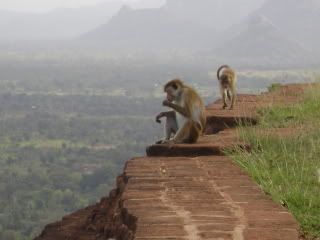
It's difficult if not impossible to quantify just what it means to live in a country with a low per capita income, however. A few years ago, however, the king of Bhutan had an idea. Bhutan has a fairly low income ($1,321) and the king got tired of seeing the country, which is sandwiched between China and India, referred to as poor. So he created an alternate index called -- I'm not making this up -- Gross National Happiness.
(11th Century frescoes in Siguriya)
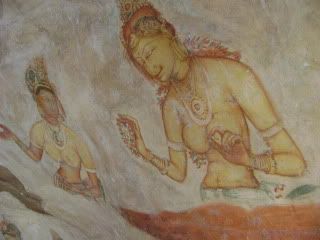
Gross National Happiness is easier to say than it is define, but it was the king's attempt to integrate cultral values into living standards -- i.e., money isn't everything. Some economists took the notion seriously, with one suggesting happiness be measured through a recollection of recent memories. A more accepted definition processed seven criteria including economic wellness (things like debt and income), environmental wellness (pollution, traffic and noise), physical wellness (health and illness), workplace wellness (unemployment, job change, workplace complaints adn lawsuits), social wellness (crime, divorce, abuse), and political wellness (quality of democracy, freedoms and wars). Wait -- is that only six? Oh well ...
(Girls in Siguriya)
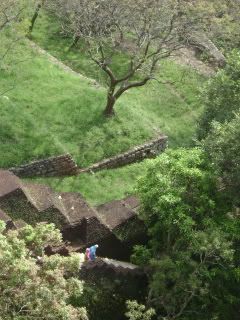
The resulting list, not surprisingly, showed Bhutan ranked 8th in the world in happiness. It also, not surprisingly, showed many "rich" nations were unhappy, and many "poor" nations had good things going on.
(Local tourists in Polunnawara focus on what is really exotic -- Laura)
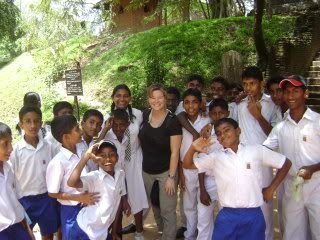
I haven't been to Bhutan, but I have been to a lot if not most of the world's poor places, and my experiences are that many of the world's richest nations -- America included -- are places where people are also pretty unhappy. On our last RTW, in Calcutta, there was an unbelievable downpour one afternoon. Calcutta, as you can imagine, lacks a lot of things, like storm drains. The streets filled up so high with water that store keepers made dams to keep their shops dry, and the cars gradually all stalled. Then, when it became quiet (the power was cut), the rickshaw drivers came out, all of them filthy, barefoot and seemingly much too skinny to pull people around. All of them had the most magnificent smiles on -- the busses were stranded, the taxis grounded, and they would finally get their day. That's happiness. Yesterday, grinding through rushhour traffic in Colombo, we glimpsed an empty lot amidst the tumbledown apartment blocks. There were piles of trash (Colombo went something like three weeks without trash collection this month), there were stray dogs, there were abandoned cars, there were people bivouakced in allwys. And in the middle of it all there was a group of kids playing cricket with a stick and a plastic ball. That's happiness. The woman in Atlanta upset about her browning lawn? Is that happiness?
(Monitor lizard on 12th Century ruin in Polunnawara)

(Polunnawara -- Buddha's feet)
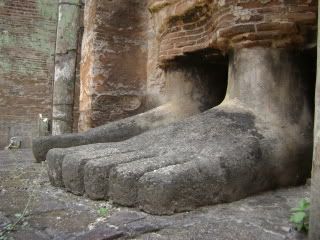
(Polunnawara)
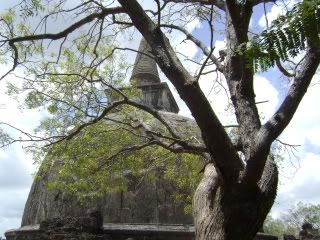
3 comments:
A great post, Jeff. Thanks.
Great Post. Sensitive reporting. You opened my eyes.
One of your best yet. Great observations, musings, and photos.
Underlying your post is the reality that cash-based economies are just one type of economy. It's the modern way, yes, but it has some pitfalls, including a false assessment of true wealth. Countries that still have villages with a hunter/gatherer, communal, or barter element tend to be happier places. Things are less stratified. There generally isn't much in the way of keeping up with the Joneses, because the Joneses live about the same way as you do.
Things are more complicated than that, but the essence is that the King is right, and Bono, for once, is wrong. (Sort of -- but don't get me started about health care. That's where the Happiness Index can break down as a useful guage.)
Post a Comment